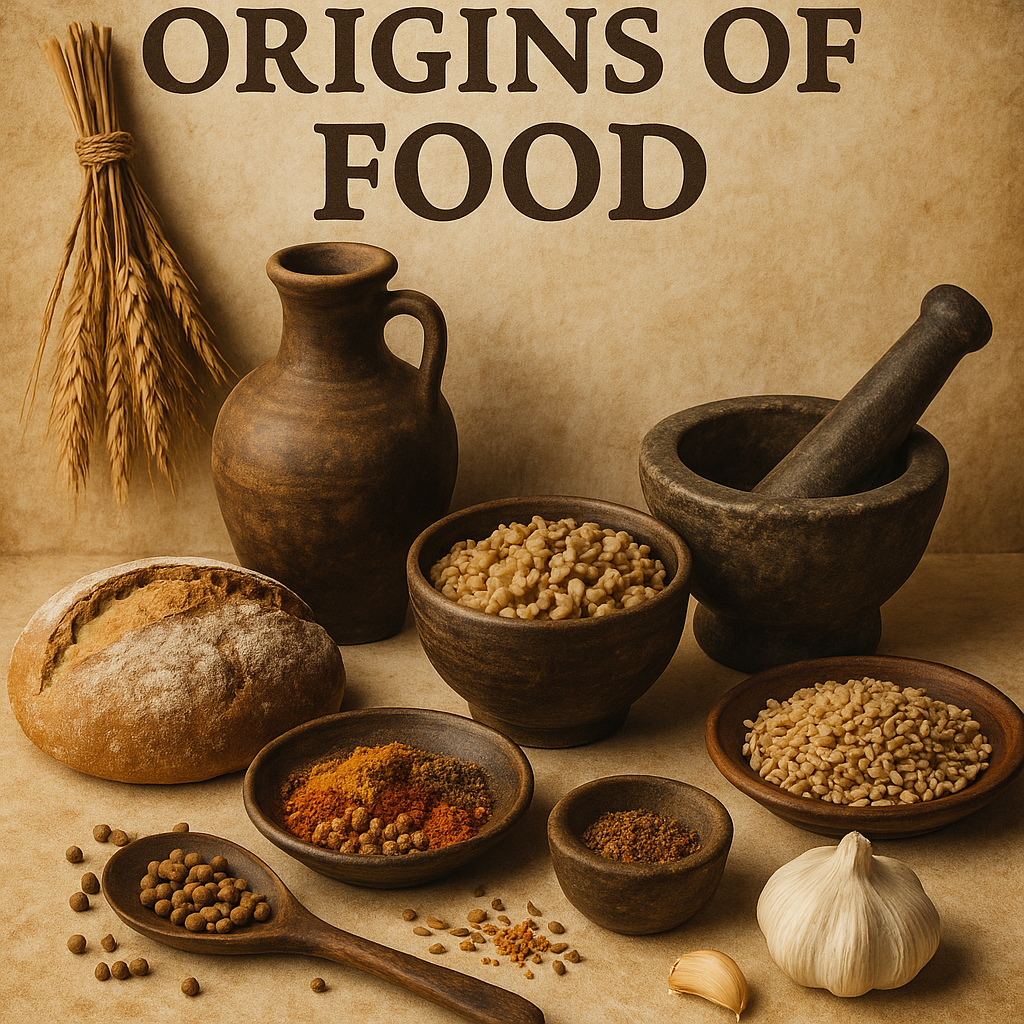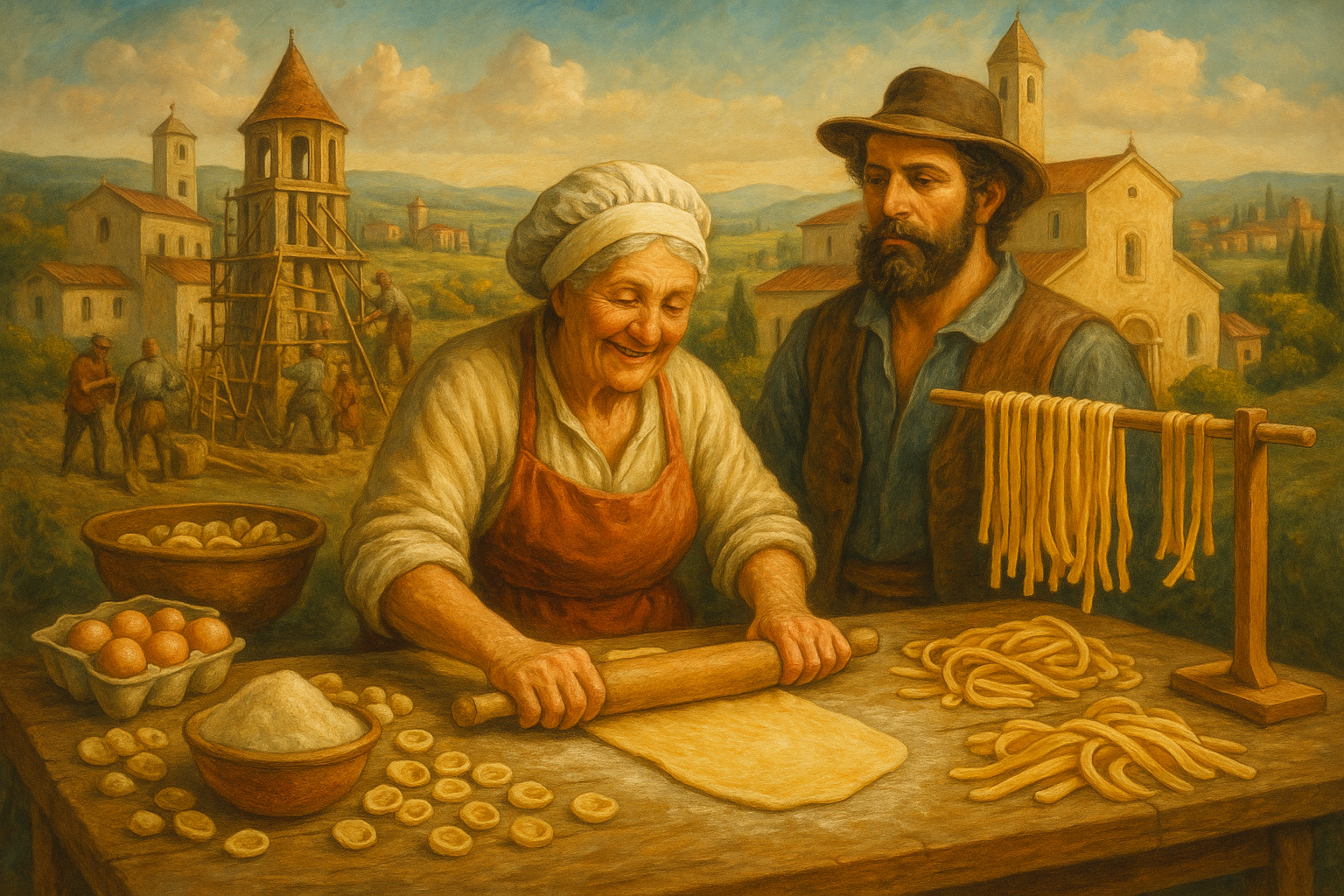
The Timeless Allure of Food Origins
The origins of food fascinate me. Every dish is more than a recipe—it’s a doorway to a different era, a different world. Through flavour, we encounter culture, survival, creativity, and trade.
Each bite contains a legacy of the land, climate, and people who turned raw ingredients into nourishment. When I think about food, I see the hands that shaped it through time. From ancient grains to complex spice routes, we taste history itself.
Who First Discovered Bread-Making Secrets?
It’s captivating to imagine early humans experimenting with wild grains, forming a rough dough by mixing flour and water. Perhaps one day, someone left this paste out too long, unknowingly creating the first fermented bread.
Was it magic or a mistake? That moment of discovery—adding yeast to make the dough rise—transformed cooking forever.
Bread-making became more than just preparation. It turned into a ritual, tradition, and communal art form. Around fires, these first bakers might have shared methods, developing what would become an essential food for humanity.
What Inspired Ancient Recipes?
I often imagine early kitchens bustling with energy. Picture people gathered, tossing ideas and ingredients into pots, fueled by both instinct and boldness.
A forager stumbles upon a wild herb, blends it into a stew, and boom—a new flavour is born. It was trial and error, but it was also genius.
The environment shaped these dishes. What grew nearby became what people ate. And as cooks learned to combine their resources creatively, they became artists, composing dishes that brought comfort and identity.
How Did the Spice Trade Shape Global Cuisine?
Few things transformed world flavours as profoundly as the spice trade. Cinnamon, saffron, pepper—they weren’t just commodities, but treasures.
Spices crossed oceans, deserts, and borders. In doing so, they crossed into recipes. A pinch of spice could change a dish—and connect entire continents.
They became culinary passports. Each time someone stirred nutmeg into a sauce or sprinkled turmeric into a stew, they added history to their meal.
When Did Pasta Evolve in Italy?
Pasta’s journey in Italy is a rich blend of folklore and fact. Some trace its early forms to the Etruscans and Romans, while others see Arabic influence during medieval conquests in Sicily.
But what’s clear is how Italian creativity gave rise to a beloved global dish. Different regions embraced different pasta shapes, each reflecting local traditions and preferences.

Families shaped the dough with care, and the legacy they created now fills plates across the world. Pasta tells a story of adaptation, artistry, and shared joy.
Why the Origins of Food Intrigue Me So Deeply
There’s something magical about the culinary courage of our ancestors. How did they know yeast would make bread rise? Or that spices could elevate a meal?
The thrill of discovery must have been profound. Every step forward in food was a leap of faith—one that shaped traditions we now follow without thinking.
Today, I find joy in tracing these origins. They remind me how human we all are—curious, inventive, and always looking for ways to feed body and soul.
How the Origins of Food Reveal Our Shared History
Food origins are more than trivia—they’re keys to understanding human progress. They show how people migrated, adapted, and innovated. Each preserved recipe or technique tells a story about survival, connection, and creativity.
We may not think about it as we eat, but even familiar ingredients like rice or tomatoes have crossed continents. They carry with them stories of explorers, farmers, and cooks who passed their knowledge on.
Why This Culinary Journey Matters
By exploring where our food comes from, we deepen our appreciation for what’s on our plates. We realize that recipes are living history. And we find new ways to connect with people across cultures.
Every time I cook or write about these stories, I feel part of something bigger. Food is more than sustenance—it’s language, memory, and community.
Quick Reflections on the Origins of Food
Bread likely began as a lucky accident—fermentation meets fire.
Spices were once more valuable than gold, shaping trade and taste.
Pasta has evolved through centuries of cultural fusion.
Food inventions came from both necessity and bold experimentation.
The flavour is a global dialogue—every recipe tells of travel and trade.
Frequently Asked Questions
Who were the first bread makers?
Likely ancient Egyptians or Mesopotamians, experimenting with wild grains and discovering fermentation.
Where did pasta originate?
Italy refined pasta, but early forms existed in China and the Middle East. The version we love today evolved mainly in Southern Italy.
Why did spices matter so much in history?
They preserved food, enhanced flavour, and symbolised status. Spices also motivated exploration and trade.
How does knowing food history affect cooking today?
It inspires creativity and helps us respect the ingredients and processes we often take for granted.
Can food history teach us about culture?
Absolutely. Food is one of the clearest reflections of a society’s values, struggles, and creativity.
What’s the most surprising food origin?
Chocolate! It began as a bitter ceremonial drink in Mesoamerica, long before it became a sweet treat.
Conclusion: Every Meal Is a Story
My fascination with the origins of food continues to grow. There’s something profoundly human in the journey from raw ingredients to beloved dishes.
Through bread, spices, and pasta, we glimpse the stories of the people who shaped our tastes. And we honour them by continuing to cook, share, and celebrate food together.
So, the next time you take a bite, ask yourself: Where did this come from? The answer might surprise you—and deepen your love for what’s on your plate.
Ready for more delicious recipes and cooking tips? Join my culinary community and let’s get cooking!
* Blog: chefbobbycooks.com
* Facebook: facebook.com/ChefBobbycooking
* Instagram: @chefbobbycook
* TikTok: @chefbobbycooks
* YouTube: ChefBobbyCooks
* Twitter: @ChefBobbyCooks
* Pinterest: ChefBobbyCooks
* Discord: Join my cooking community on Discord!